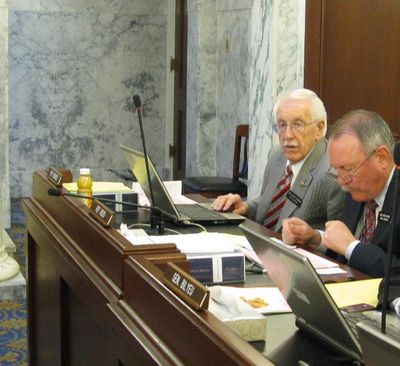Idaho lawmakers deadlock over liquor hours

BOISE - A North Idaho lawmaker led a move Monday to try to kill the state Liquor Division’s plans to experiment with later hours, til 9 p.m., at its busiest stores, saying that would promote more alcohol consumption.
The issue deadlocked the Legislature’s joint budget committee and prompted it to delay setting the Liquor Division’s budget, as two North Idaho senators led the opposition to the move, saying tourists expect liquor stores to be open later than 7 p.m. and the state stands to gain $2 million from opening for the extra hours.
Rep. George Eskridge, R-Dover, proposed deleting from the agency’s budget its proposal to spend $455,000 for extra staff for the later hours, a six-month experiment that agency officials said should gain the state a $2 million return. Ten Idaho state liquor stores already stay open until 9 p.m. at least two days a week; the plan would try the later hours at 27 more.
“We have to recognize there is an issue between making money and responsible use,” Eskridge declared. “This is the gettin’-in-trouble time. This is when the parties start winding out of their refreshments, and people say, ‘Let’s just make one more stop, the liquor store’s still open, we can go down and get some more and we can party-hearty longer.’”
Eskridge said, “Seven to 9 p.m. is not a normal time for buying liquor for responsible people. Responsible people usually do that right after they get off work or on Saturdays.”
Sen. Joyce Broadsword, R-Sagle, offered an alternative budget plan for the agency leaving out Eskridge’s change, but it failed on a tied vote in the Joint Finance-Appropriations Committee.
“The agency has taken a very thoughtful, conservative approach to the store expansion hours,” Broadsword said. “We’re looking for money, we asked them to go out and figure out how they could make more money.”
Sen. Shawn Keough, R-Sandpoint, said tourists in her district often don’t arrive until evening, or get off the lake or the ski slopes, and they need to stock their condos; the later hours make sense for that, she argued.
Other lawmakers on the joint committee backed Eskridge’s move, saying the state shouldn’t make alcohol more available in any way.
Among the most outspoken was Rep. John Vander Woude, R-Nampa, who operates a convenience store that sells beer and wine and is open until 11 p.m. He argued, “By extending the hours, we’re saying it’s OK to increase consumption for our profit and that’s why we want to do it.”
Vander Woude said afterward that he doesn’t view state liquor sales as competing with his store’s beer and wine sales. “They sell the hard liquor, I don’t sell any of that,” he said. “I just sell beer and wine.”
Rep. Wendy Jaquet, D-Ketchum, said the liquor division consulted with the Idaho State Police before making the proposal, and determined that most liquor-related problems occur after 10 p.m.; that’s why the agency set the closing time in its proposal at 9 p.m.
After much debate, Eskridge’s proposal also failed in the joint committee, on a 9-11 vote; the panel then agreed to put off setting the state liquor agency’s budget for at least another day.
Eskridge said he’s never heard any complaints about Idaho’s state liquor stores closing too early. Staying open ‘til 9, he said, “just makes it more accessible.”